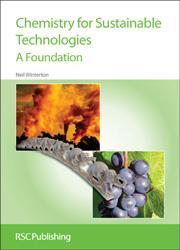Chemistry for sustainable technologies: a foundation
Chemistry for sustainable technologies: a foundation
Neil Winterton
Cambridge, UK: Royal Society of Chemistry 2010 | 504pp | ?62.99 (HB)
ISBN 9781847558138
Reviewed by James Clark

Green chemistry is now such an accepted concept that some might question the need for a another introductory text. Early books such as Green chemistry: an introductory text have been superseded by more specialist texts describing individual topics such as alternative solvents and renewable resources.
However, while specialist areas have helped to give substance to the concept, there perhaps still remains a need to see green chemistry in a wider context - historical (why did we need green chemistry?), intellectual (addressing serious complexities and challenges) and societal (how we can continue to consume limited resources but in a sustainable way?).
Neil Winteron’s book sets out to do this in a way that will appeal to young chemists and others with an appreciation of the importance of reconciling our needs with those of the planet through better science. This an ambitious single author work that introduces its readers to chemistry and sustainability with generous use of illustrations, case studies and references, and with a personalised approach based on many years working in chemistry and the chemical industry.
In the first half of the book the topics covered are remarkably diverse and range from the very general such, as ’what is science’, to the more specialised, such as ’green chemistry metrics’. The chapter on the chemistry of the environment is an excellent introduction to the subject that would be suitable for non-specialists. The chapter on waste is very welcome, although it might have benefited from the more modern ’closed loop’ approaches and industrial symbiosis. The second half of the book is more appropriate for chemists wanting to know about the major topics in green chemistry and includes chapters on catalysis, processing, biomass and energy.
RSC members can purchase this book direct from the RSC for a 35% discount.












No comments yet